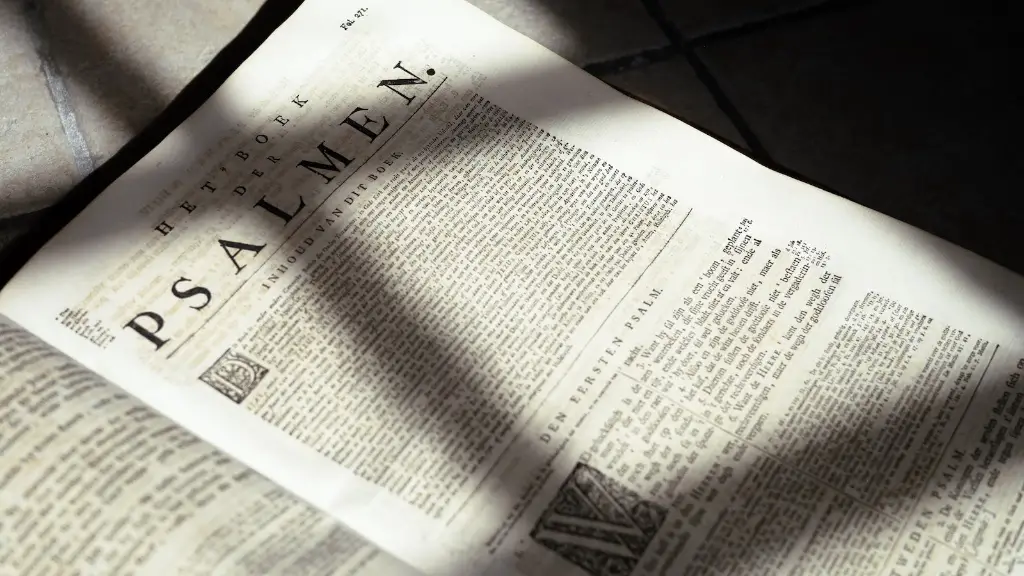The book of Maccabees is a Jewish document, included in most versions of the Bible outside of the Protestant Bibles. It is a set of four books written during the late Hellenistic period, between 200 and 134 B.C., based on the stories of the Maccabean Revolt of the Jews against the Seleucid Empire. This revolt would ultimately become the basis for the festival of Chanukah. The books of Maccabees are widely accepted as part of the Old Testament and are included in the Catholic Bible and other versions. So, why is the book of Maccabees not included in the Protestant Bible?
The answer lies in the divergence between Protestantism and Catholicism. The Protestant Reformation of the 16th century led to the Protestant denomination’s rejection of books in the Old Testament that weren’t found in the original Hebrew text. These books, known as the Apocrypha, include the book of Maccabees amongst others. Because of this, the Protestant Bible does not include the book of Maccabees and is structured differently from the Catholic and other versions of the Bible.
The book of Maccabees is an important part of Jewish history, as it tells the story of the Maccabean Revolt. The Maccabees were a group of Jewish rebels against the Seleucid Empire. The revolt, which ultimately ended in victory for the Maccabees, is celebrated every year during Chanukah. The book of Maccabees provides an important historical record of the events of the revolt, including the prayers uttered by the Jews who faced their oppressors.
The book of Maccabees also contains important religious teachings, including the concept of martyrology and the everlasting covenant between God and the Jews. These teachings are seen as liberating and essential, even by modern-day Jews all around the world. As such, it is seen as tragic that the book of Maccabees is not in the Protestant Bible, as it is an important source of Jewish theology.
The exclusion of the book of Maccabees from the Protestant Bible has caused some controversy and debate amongst theologians and historians. Experts believe that it was a mistake to exclude the book from the Protestant Bible, as it is an important document for understanding the history of Judaism. Many argue that the decision to exclude the book was based on political and ideological grounds, rather than on theological ones.
Despite its exclusion from the Protestant Bible, the book of Maccabees is still an important part of Jewish history and theology. It remains a valuable source of knowledge and understanding, and continues to be studied by scholars and theologians alike. Those who wish to explore it further can still find it in other versions and translations of the Bible.
Dialogue and Character Development
The books of Maccabees are filled with various conversations among different characters which help to illustrate the in-depth emotions and motivations behind many of their decisions. From hard-headed politicians to passionate revolutionaries, the conversations in Maccabees distinguish and showcase each group’s convictions and concerns. The dialogue develops an appreciation of the struggles at the time, while presenting the characters with humane qualities and flaws to which readers can relate. Through this dialogue, readers gain a better understanding of not just the timeline of events, but of the characters themselves.
Martyrdom as a Theme
The book of Maccabees is also known for its theme of martyrdom, a theme that carries profound implications even today. It underscores the notion that the most valuable act one can undertake is to embrace one’s faith and values even when threatened by death. The concept of martyrdom is outlined through a large cast of inspiring and brave characters, whose stories are shared throughout the course of the document. Readers of Maccabees will find themselves empowered by the characters’ courage, and are taken on a hopeful journey for justice and peace in the age of oppression.
Language and Literary Style
Further, the books of Maccabees are also remarkable for their language and literary style. While the language may be seen as archaic to many modern English readers, there is much to appreciate in its unique style. Ancient diction and poetic language combine to make some of the passages in Maccabees immensely captivating and inspiring. From the carefully worded proclamations to the heart-wrenching deaths of beloved characters, the beauty and poignancy of the language will leave readers captivated and moved.
Influence on Jewish and Christian History
The book of Maccabees has also played an important role in the shared history of Jews and Christians. Despite only appearing in some Bibles, Maccabees is a foundational document for many Jewish and Christian beliefs. It is from this document that many later traditions and beliefs were formed, including the celebration of Chanukah for Jews and the Advent for Christians. Through its influence on the shared histories of both religions, the book of Maccabees continues to hold great significance and is an important part of the religious development of both faiths.
Ongoing Relevance
Despite its absence from many English versions of the Bible, the book of Maccabees is still an essential document to explore. Featuring themes such as martyrdom and dialogue, the book is filled with insights and interpretations that can entertain and enlighten. Its influence can still be felt today, as the stories it tells continue to be relevant. Through its ongoing contribution to the history of both Jews and Christians, it is certain that the book of Maccabees will remain an important document for many years to come.


